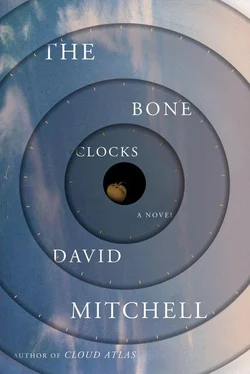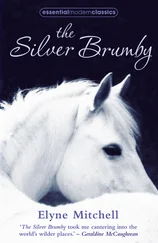“You speak English,” I blurted.
“M’father taught me.” She spoke to the warriors in what I would soon recognize as Noongar and sat on a rock by the fire. One of them prised the stick out of Caleb Warren’s fingers and sniffed the sausage. He took a cautious bite, and another. “Y’guide’s a baddun.” The woman spoke to the fire while addressing me. “He’s a plan to fill y’with grog, hit y’head, take y’money, throw y’off that cliff. Yer’ve more money’n he’ll see in two year, see. Big …” she searched for the word, “… tempting . That the right word, issit?”
“Temptation, perhaps.”
The woman clicked her tongue. “He’s a plan t’tell Swan River whitefellas you go in bush’n never come back no more. Steal y’goods.”
I asked her, “How can you know that?”
“Fly out.” She touched her forehead and one-handedly mimed a fluttering. “Y’know how. Aye?” She watched my reaction.
I felt a rushing sensation in my chest. “You’re … psychosoteric?”
She leaned closer to the fire. I saw European angles to her jaw and nose. “Big word, mister. Ain’t speak English boola time. F’get boola . But my soul-spot bright.” She tapped her forehead. “You, same. Boylyada maaman . Yurra spirit talker too.”
I tried to etch every detail onto my memory. The four warriors were rifling through Warren’s backpack. The stumpy dog sniffed about. Burning driftwood spat out sparks. Pablo Antay Marinus had happened upon a female Aborigine psychosoteric on the western edge of the Great Southern Continent. She was chewing a sausage now, and belched. “What y’name-it, this … pig-meat-stick?”
“A sausage.”
“Sausage.” She tasted the word. “Mick Little made sausages.”
The statement begged the question: “Who’s Mick Little?”
“This body’s father. Esther Little’s father. Mick Little kill pigs, make sausages, but he die.” She mimed coughing and held out her hand. “Blood. Like this.”
“Your body-father died of tuberculosis? Consumption?”
“That’sitsname it is, aye. Then men sell farm, Esther’s mother, a Noongar woman, she go back in bush. She takes Esther. Esther die, and I go in her body.” She frowned, rocking to and fro on her heels.
After a little time, I spoke up. “This body’s name is Pablo Antay Marinus. But my true name is Marinus. Call me Marinus. Do you have a true name?”
She warmed her hands at the fire. “My Noongar name’s Moombaki, but I’ve a longer name what I ain’t tellin’.”
Now I knew how Xi Lo and Holokai had felt upon entering the Koskov family’s drawing room in Saint Petersburg, fifty years earlier. Quite possibly this Atemporal Sojourner would want nothing to do with Horology, nor care that there were others like her, scattered thinly throughout the world, but I felt heartened that we were a species one individual less endangered than fifteen minutes before. I asked my visitor my next question in subspeech: So do I call you Esther or Moombaki? Time passed and no answer came. The fire shifted its burning bones, and sparks spiraled up as the warriors spoke to one another in quiet voices. Just as I concluded that she wasn’t telepathic, she subreplied: You a wadjela, a whitefella, so t’you, I’m Esther. If yurra Noongar, then I’m Moombaki .
“This is my thirty-sixth body,” I told Esther. “You?”
Esther killed questions she found irrelevant by ignoring them, and she did it now. So I subasked, When did you first come to this land? To Australia?
She patted her dog: I’m always here .
A Sojourner has that luxury. You never left Australia?
She told me, “Aye. I stay on Noongar land.”
I envied her. For a Returnee like myself, each resurrection is a lottery of longitudes, latitudes, and demography. We die, wake up as children forty-nine days later, often on another landmass. Pablo Antay tried to imagine an entire metalife in one place as a Sojourner, migrating out of one old or dying body into a young and healthy one, but never severing one’s ties to a clan and its territory. “How did you find me?”
Esther gave the last lump of sausage to the dog. “The bush talks dunnit? We listen.”
I noticed the four warriors taking the saddlebags from the mule. “Are you stealing my baggage?”
The half-Aborigine rose. We carry y’bags. To our camp. You gunna come?
I looked at Caleb Warren and subworried, Something’ll eat him, if we leave him here . “Or he might just catch fire, or melt.”
Esther inspected her hand. Soon, he wake, his head like bees. He think he kill you already .
WE WALKED MOST of the night to an outcrop whose Noongar name meant “Five Fingers” in English, not far from present-day Armadale. This was home for the warriors’ clan, and the season’s residence for Esther. When day broke, I tried to make myself as useful to my hosts as I could, but although I’d been resurrected as Itsekiri, Kawésqar, and Gurage tribespeople in earlier lives, I’d grown pampered as Lucas Marinus, Klara Koskov, and Pablo Antay, and two centuries had passed since I had hunted and foraged for dinner. I was of more use in helping the women to cure kangaroo hides, setting a broken arm, and gathering bush honey. I also busied myself gratifying my curiosity as a proto-anthropologist: My journals describe the burning of scrubland to smoke out game; totemic animals; a visit by five men from the south to trade red ocher for prized burdun wood; and a paternity suit, settled by Esther, who ingressed into a fetus to perform a psychosoteric DNA test. Esther’s skin-group showed me the pity owed to a simpleminded uncle, a distrust of my Europeanness, and respect for a Boylyada maaman colleague of Moombaki’s. The children were the least reserved. One boy named Kinta used to borrow my jacket and hat and strut about, and they all liked showing off their bushcraft skills to the clumsy pale visitor. My attempts to speak Noongar caused endless amusement, but with the tribe’s help Pablo Antay compiled the best extant glossary of the Noongar language.
Moombaki, I learned, was not thought of as a god but a spirit guardian, a collective memory, a healer, a weapon of last resort, and a sort of assize judge. She moved from skin-group to skin-group at the start of each of the six Noongar seasons, helping each family and clan as best she could, and circulating the idea that violent resistance to the Europeans would result in more dead Noongar. Some called her a traitor, she told me, but by the 1870s her logic was demonstrable. The Europeans were too many, their appetites too voracious, their morality too fickle, and their rifles too accurate. The Noongar’s slim hope of survival lay in adaptation, and if this altered what it meant to be Noongar, what choice was there? Without knowledge of the Ship People’s minds, however, even this slim hope was doomed, and so Moombaki had chosen a ten-year-old half-caste girl for her present sojourn. Similarly, she had invited Pablo Antay to Five Fingers with a view to learning about the world and its peoples.
By night, then, Esther and I sat across the fire from each other at the mouth of her small cave and subspoke about empires, their ascents and falls; about cities, shipbuilding, industry; slavery, the dismemberment of Africa, the genocide of the natives of Van Diemen’s Land; farming, husbandry, factories, telegraphs, newspapers, printing, mathematics, philosophy, law, and money and a hundred other topics. I felt like Lucas Marinus once did, lecturing in the houses of the Nagasaki scholars. I talked about who the settlers landing at Fremantle were, why they had voyaged here, and what they believed, desired, and feared. I tried to explain religion, too, but the Whadjuk Noongar had a distrust of priests after men had distributed blankets “from Jesus” to several clans up the Swan River, only for the recipients to die a few days later of what sounded like smallpox.
Читать дальше












